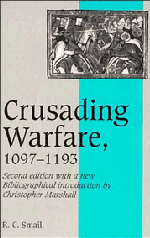Book contents
- Frontmatter
- Contents
- List of plates
- List of maps
- List of plans
- Preface (1954)
- List of abbreviations
- Bibliographical introduction (1994)
- I The historians of crusading warfare
- II Warfare and policy in Latin Syria
- III Franks, Armenians, and Syrians
- IV The Muslim armies
- V The Latin armies
- VI The Latin field army in action
- VII The Crusaders' castles
- Bibliography
- Bibliography to the second edition
- Index
- Plate section
II - Warfare and policy in Latin Syria
Published online by Cambridge University Press: 29 September 2009
- Frontmatter
- Contents
- List of plates
- List of maps
- List of plans
- Preface (1954)
- List of abbreviations
- Bibliographical introduction (1994)
- I The historians of crusading warfare
- II Warfare and policy in Latin Syria
- III Franks, Armenians, and Syrians
- IV The Muslim armies
- V The Latin armies
- VI The Latin field army in action
- VII The Crusaders' castles
- Bibliography
- Bibliography to the second edition
- Index
- Plate section
Summary
SOME EARLIER OPINIONS
Warfare in Latin Syria had a double aspect. It was both a profitable pastime for feudal magnates, and an instrument of policy employed by the rulers of the Latin states. This study is concerned with warfare of the second kind, and the subject of this chapter is the effect of the ends on the means, of the aims of policy on military methods.
It is a matter on which views have been expressed by earlier students. It was Delbrück's opinion that the principles of strategy could not be applied to crusading warfare, because the Crusades were born of mystical rather than political motives. Certainly the preaching of the First Crusade appealed to Christian abhorrence of Islam; but from the first other motives were present, and the crusade included, besides a Peter the Hermit, land-hungry Normans and the Genoese, eager to exploit commercial opportunity. For the small body of Latin settlers it was impossible to maintain relations permanently with their Muslim subjects and neighbours in the spirit of the Holy War. A modus vivendi was essential, and from an early date diplomatic and political relations were established between Franks and Muslims. On occasions religious fervour might inflame the conflict produced by the clash of mundane interests; but the normal external policies, and therefore the warfare, of Latin and Muslim rulers were inspired by rational motives.
- Type
- Chapter
- Information
- Crusading Warfare, 1097–1193 , pp. 18 - 39Publisher: Cambridge University PressPrint publication year: 1994

